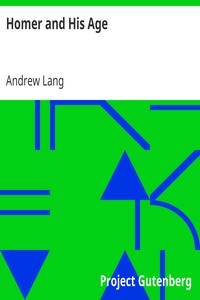Homer and His Age by Andrew Lang
Read now or download (free!)
| Choose how to read this book | Url | Size | ||||
|---|---|---|---|---|---|---|
| Read online (web) | https://sendtokindle.compellingsciencefiction.com/ebooks/7972.html.images | 644 kB | ||||
| EPUB3 (E-readers incl. Send-to-Kindle) | https://sendtokindle.compellingsciencefiction.com/ebooks/7972.epub3.images | 299 kB |
Send
to kindle email: |
|||
| EPUB (older E-readers) | https://sendtokindle.compellingsciencefiction.com/ebooks/7972.epub.images | 309 kB | ||||
| EPUB (no images, older E-readers) | https://sendtokindle.compellingsciencefiction.com/ebooks/7972.epub.noimages | 302 kB | ||||
| Kindle | https://sendtokindle.compellingsciencefiction.com/ebooks/7972.kf8.images | 531 kB | ||||
| older Kindles | https://sendtokindle.compellingsciencefiction.com/ebooks/7972.kindle.images | 486 kB | ||||
| Plain Text UTF-8 | https://sendtokindle.compellingsciencefiction.com/ebooks/7972.txt.utf-8 | 569 kB | ||||
| Download HTML (zip) | https://www.gutenberg.org/cache/epub/7972/pg7972-h.zip | 291 kB | ||||
| There may be more files related to this item. | ||||||
Similar Books
About this eBook
| Author | Lang, Andrew, 1844-1912 |
|---|---|
| Title | Homer and His Age |
| Note | Reading ease score: 67.6 (8th & 9th grade). Neither easy nor difficult to read. |
| Contents | The Homeric age -- Hypotheses as to the growth of the epics -- Hypotheses of epic composition -- Loose feudalism: the over-lord in "Iliad," books I and II -- Agamemnon in the later "Iliad" -- Archaeology of the "Iliad": burial and cremation -- Homeric armour -- The breastplate -- Bronze and iron -- The Homeric house -- Notes of change in the "Odyssey" -- Linguistic proofs of various dates -- The "Doloneia": "Iliad," book X -- The interpolations of Nestor -- The comparative study of early epics -- Homer and the French mediaeval epics -- Conclusion. |
| Credits |
Produced by David Moynihan, Lee Dawei, Miranda van de
Heijning, David Widger, and the Online Distributed Proofreading Team. |
| Summary | "Homer and His Age" by Andrew Lang is a scholarly work written in the late 19th century that examines the historical and cultural context of the Homeric epics, particularly addressing the debates surrounding their authorship and unity. Lang argues against the prevalent belief that the "Iliad" and "Odyssey" are the products of multiple authors over various centuries, asserting instead that they originate from a single cohesive cultural moment. The text delves into the life depicted in the epics, challenges criticisms about inconsistencies, and discusses the poet's authentic audience and intent. The opening of the work sets out Lang's intention to defend the integrity of Homeric poetry against the "analytical reader," who imposes modern critical expectations on ancient texts. He critiques contemporary scholarly theories that promote the idea of the epics being a collection of varied contributions made over time, emphasizing instead their representation of a harmonious cultural snapshot. Lang dismisses the argument that poets in uncritical eras can purposefully reproduce precise historical details from the past, suggesting that the unity found in Homer’s work indicates its origin from a single poetic voice, reflecting a specific age and society. (This is an automatically generated summary.) |
| Language | English |
| LoC Class | PA: Language and Literatures: Classical Languages and Literature |
| Subject | Homer |
| Subject | Epic poetry, Greek -- History and criticism |
| Subject | Homer -- Homes and haunts -- Greece |
| Subject | Civilization, Homeric |
| Category | Text |
| EBook-No. | 7972 |
| Release Date | Apr 1, 2005 |
| Most Recently Updated | Apr 9, 2013 |
| Copyright Status | Public domain in the USA. |
| Downloads | 186 downloads in the last 30 days. |
| Project Gutenberg eBooks are always free! | |

